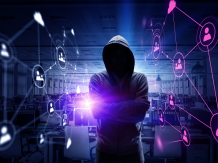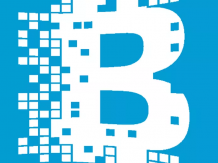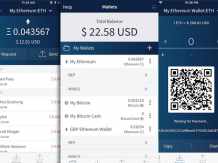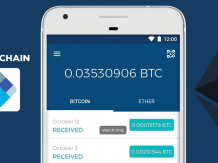Expect to see blockchain showing up in particular where there are groups of interlinked organizations. That could include one company and its suppliers, or it could be consortiums of competitors and and their suppliers.
IBM and Maersk have a partnership to use blockchain to smooth shipping operations. A single blockchain can help exporters, shipping companies, port authorities and importers cooperate.

Thats a problem. The less trust you have, the harder everything becomes. Did that job candidate really graduate from college? Did your brother-in-law really repay that loan?
Heres how it works. When you and others announce transactions to a blockchain network, computers on that network race to solve a complicated mathematical puzzle based on those transactions. A computer that succeeds announces it to the network, and the transaction is accepted if other computers verify that none of the assets in question were already used. Thats whatll keep you from selling the same concert ticket twice on a blockchain-based ticket market. (Citizen TicketandActive Ticketingare working on this.)
Bitcoins value has soared and plunged over the last year, and its hard to separate the sensible from thescamsamong the1,500 other cryptocurrencies. But blockchain has enjoyed more stable appeal.
So its not perfect. But it doesnt have to be. Blockchain just has to be better than what we have today. There are a lot of underhanded cryptocurrency dealings, but regulators are now reining in abuses, saidRick Levin, chairman of the financial technology and regulation team at the AmLaw law firm Polsinelli. Likewise, engineers are hammering out improvements to blockchain and big names like Nasdaq and Goldman Sachs are embracing it.
If county clerks saw the benefit, they could gradually move to the system — its decentralized, not Propys own database. Propy hopes to profit by taking a percentage of the sales it facilitates, but at the same time, it also hopes to cut purchasers costs — for example by eliminating the thousands of dollars that title insurance can cost.
Cryptocurrency mining computers like this Antminer S9 from Bitmain may look modest, but when stacked by the thousands theres immense horsepower to make todays blockchains work.
There are thousands of counties in the US, each with its own record of who owns what. One startup,Propy, hopes to digitize those records, mirroring the records initially the way title companies do, but also storing them on the blockchain, said CEO Natalia Karayaneva.
Goyal expects blockchain will help automate all sorts of transactions. For example, if its used to register your car purchase, that could trigger a cascade of other operations, like transferring the cars cryptographic keys that let its owner unlock the car.
This is part ofBlockchain Decoded, a series looking at the impact of blockchain, bitcoin and cryptocurrency on our lives.
That decentralization and synchronization means no single party controls the data. If one business sells an asset to another, each sees the same data. Theres no need for lawyers at one company to call the other if their accounting databases disagree, because theres only one accounting database.
Cryptography — mathematical methods of keeping data secret and proving identity — now enters the picture when it comes to recording transactions. Blockchain uses the same cryptographic key technology that keeps hackers from sniffing your credit card number when you type it into an e-commerce website. One digital key ensures only you can enter a transaction to the blockchain involving your assets, and another digital key lets someone else confirm it really was you who added the transaction.
The original blockchain was described in a2008 bitcoin paper by Satashi Nakamoto, a pseudonym for a person or perhaps group that unified some ideas into the first working cryptocurrency. The idea became reality with the release of open-source bitcoin software in 2009. Thebitcoin blockchain now records about 300 million transactionsand counting.
In most networks, you have a balance between data that can be kept private, but enough public that you can attest to its veracity, Behlendorf said.
Blockchain is best known as the technology behind the cryptocurrencybitcoin– a digital currency whose value soared above $19,000 over the last year before slumping to half that when the frenzy subsided. But blockchain is so much more, potentially easing the doubts and uncertainties that dog so much of life — whether buying a used car from a stranger,having faith that a piece of fruit really is organicor knowing that a prescription drug isnt counterfeit. Blockchain, in effect, hard-wires trust into transactions or data that we might otherwise be more cautious about.
But for companies averse to sharing data with competitors, blockchains transparency is a difficulty. There are mechanisms for handling the challenge, Behlendorf said.
Because blockchains work as a secure digital ledger, a bumper crop of startups are hoping to bring it tovotinglotteriesID cardsandidentity verificationgraphics renderingwelfare paymentsjob huntingandinsurance payments.
But todays mining approach, called proof of work, has huge drawbacks.
If bitcoin was the first generation of blockchain andEthereumthe second, there are a number of people hoping their project will catch on as the third.
She points out plenty of other areas where blockchain falls short of its promises. The immutability comes at a cost, lacking some of the mechanisms for recourse found in todays slower processes. Companies cooperating to set up their own private blockchains, rather than using public ones like Ethereum, must have some trust already to set up rules for access and governance.
A lot of that revolution could be invisible to you, taking place inside and among businesses. But its potentially a very big deal. Analyst firm Gartner estimates thatblockchain will provide $176 billion in value to businessesby 2025 and a whopping $3.1 trillion by 2030.
Tezos, for example, hopes to build in better governance so its technology can move forward without the troubles bitcoin and Ethereum have suffered, said Tezos CEO Kathleen Breitman, speaking at the Techonomy conference in November — though ironically,Tezos has suffered governance problems of its ownwith a spat over its own management. Another challenger isDfinity. Itschief scientist, Dominic Williams, promises transaction speeds 600 times faster than Ethereum, which today is only a bit faster than bitcoin.
Heres another hitch: getting everybody on board. The French automaker Renault, for example, hopes for a blockchain to lock down car maintenance records. After all, who wouldnt want to know if the used car youre thinking of buying made lots of trips to the repair shop? It turns out the seller may not share your enthusiasm for that much transparency.
For one thing, mining works most profitably on powerful computers that consume immense amounts of electrical power. For example,bitcoin mining today uses about as much power as the country of Singapore, enough to power 4.4 million houses, according to cryptocurrency analyst firm Digiconomist. That amount is growing.
Heres everything you need to know about the technology powering the bitcoin cryptocurrency today and, soon, a myriad of services that will change your life.
But ether has popularized a newer idea called smart contracts. These are programs that run on the Ethereum network and take automated if-this-then-that actions. For example, a smart contract could look for the highest bid in an auction at a certain time and automatically transfer ownership rights to the auction winner.
The process for locking down a block onto the blockchain so it cant be changed, at least today, is called mining.
In 2018, we expect to see a number of projects stopped that should never have been started in the first place, saidForrester analyst Martha Bennett.
Thats no fun for embezzlers accustomed to hiding behind dodgy or altered records. Cryptocurrencies can offer anonymity to criminals, which is why its been popular for things like theWannaCry ransomware that locked up peoples computers until they paid up. But blockchain makes it easier to find the digital scene of the crime — especially with private blockchains that networks of business partners can set up to cooperate.
Be respectful, keep it clean and stay on topic. We delete comments that violateour policy, which we encourage you to read. Discussion threads can be closed at any time at our discretion.
That may sound simple, but heres a difference between blockchain and the Department of Motor Vehicles. Today, the government stores the information on its own central computer. Blockchains, though, distribute it across a group of computers — maybe even thousands of them. Each has its own copy of the blockchain transactions.
A good place to start is the name: a blockchain is an ever-growing set of data blocks. Each block records a collection of transactions — for example, that you now hold the title to the car you bought or that you paid a car dealer to get it.
Its transparent, so anyone can see exactly how many BATs were transferred and check that Brave didnt illicitly siphon any off, Brave CEO Brendan Eich said.
Another fundamental part of the blockchain is called immutability — its resistance to tampering or other changes. To understand it, you need to understand another cryptographic concept called the hash.
Hashingreduces data to a bunch of seemingly random characters — for example, thehash of the phrase the quick brown foxis 9ECB36561341D18EB65484E833EFEA61EDC74B84CF5E6AE1B81C63533E25FC8F using an encoding method called SHA-256. Tweaking just one letter in the phrase produces a completely different hash, and you cant go backward to figure out the original data from the hash.
Theres lots of work to free blockchain from the problems of transaction speed and energy consumption, though. One idea, proof of stake, uses no significant computing power and looks to be the future for the Ethereum Project, which is responsible for the ether cryptocurrency.
For another, transactions are relatively slow. Blockchain transactions can race past transactions that rely on middlemen and reconciliation procedures, like escrow accounts for home purchases or international money transfers. But bitcoin transactions can take about 10 minutes, which is why cryptocurrencies today arent useful for just buying something in a store.
But theres an unlikely solution that might help restore enough faith in strangers to make our lives a bit easier: anencryptiontechnology called blockchain.
Another way blockchain could bring many parties together is property records.
The Smartest Stuff: Innovators are thinking up new ways to make you, and the things around you, smarter.
With blockchain, hashes are linked together so any minute change is immediately visible, not just for the block housing it but for all other blocks added later. With red flags that big for changes that small, you can see why auditors would get excited.
Another blockchain project comes throughbrowser startup Brave, which relies on the technology to change online advertising in a way that improves performance and privacy while giving browser users a cut of the proceeds. Blockchain accounting, using a digital payment mechanism called thebasic attention token (BAT), enables direct payments among advertisers, publishers and browser users — for example an advertiser paying a publisher or a reader making a small one-off payment for a news article without buying a subscription.
OK, strap yourself in, because this gets a bit hairy.
These days, were having a harder and harder time trusting each other.
For example,IBM has a blockchain partnership with a long list of food suppliers and grocery retailers, including Dole, Kroger, Nestl, Tyson Foods and Walmart.
For something as hyped as blockchain, with millions of dollars raised, you have to expect some backlash. Theres plenty, starting with the criticism thatblockchain would have already taken off if its so greatand concerns that itsabetting cryptocurrency shenanigans. Theres also the concern that poorly written code could leave a faulty foundation.
I dont think its just going to vanish, Levin said. Theres too much energy behind this.
This is much more efficient than going to the DMV and filling out paperwork, he said. Its also more secure, because these keys cannot be forged. The seller cant make copies of the key and try to steal the car.
You can take a network of parties that didnt have prior experience working with each other — that didnt have reason for trust — and still find a way to build a transaction record or a history of the truth, said Brian Behlendorf, executive director for theLinux Foundations Hyperledger projectfor blockchain software.
Indeed, staid companies like IBM, Microsoft and Intel are offering blockchain as just another software tool to get business done. Other companies dabbling in blockchain includeGoldman SachsNasdaqWalmartandVisa.
Its revolutionary, saidMark Siegel, an investor at Menlo Ventures.
Overinflated expectations are nothing new to the tech industry, though, and there are enough serious players engaged that its hard to dismiss blockchain as all sizzle and no steak. Expect a winnowing as reality sets in.
Its like doing the crossword puzzle in ink instead of pencil, said Marie Wieck, head of IBMs 1,500-employee blockchain group. You will see if you change your answer to 3 across from moon to star.
CNET Magazine: Check out a sample of the stories in CNETs newsstand edition.
CNET tambin est disponible en español.
Trust is an essential part of ordinary living, whether its picking mechanics based on Yelp reviews, sliding credit cards into gas station fuel pumps or heeding our doctors advice. But our trust has been eroding for years. In the US, only 33 percent of us felt we could trust our government in 2017 — a decline of 14 percentage points from 2016, according toEdelmans annual trust barometer study. Trust in businesses dropped from 58 percent to 48 percent, too, while media (fake news!) and social networks also took a hit.
The basic attention token, developed by browser maker Brave Software, uses blockchain to oversee online ad payments that can flow among advertisers, publishers and anyone using its browser.
With smart contracts, blockchain could help automate lots of computing operations, including ones humans never touch. Your electric car could wait for favorable electricity prices before deciding when to charge itself from the grid, solar panels or in-home batteries, then the blockchain could handle accounting among all the parties.



